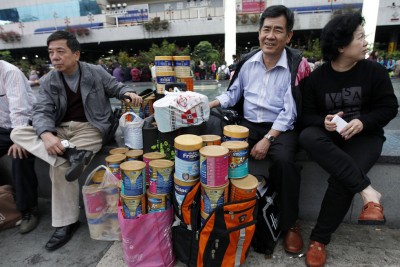
Several parallel traders managed to smuggle out close to 100 cans of baby formulas.
A principal magistrate in Hong Kong has lashed out at cross-border baby formula parallel traders, calling the trend of formula smuggled from Hong Kong to mainland China a national shame, the harshest words uttered by a principal magistrate on the controversial issue.
While hearing 23 cases involving cross-border traders on February 4, Bernadette Woo Huey-fang, the principal magistrate of Fanlin Court, reprimanded the suspects in Cantonese. “Isn’t it sad that one dares not even to eat the baby formula produced by one’s own country?”“Isn’t it sad that one dares not even to eat the baby formula produced by one’s own country?” Then she repeated it again in Mandarin, which is understood in the mainland, and added that the situation is a “national shame” before handing out a verdict on three mainland suspects.
The suspects were sentenced to two weeks in jail for carrying baby formula weighing between 16.8kg and 20.8kg, far surpassing the legal limit of 1.8kg. That limit was introduced by the Hong Kong government in 2013 in the face of growing complaints from local residents wary of increasingly limited resources because of parallel traders taking stock into the mainland. Other suspects in similar cases were fined up to RMB 6,900.
Woo said cross-border parallel trading has become “rampant”. Illegal smugglers who carried more than 20kg to 30kg of baby formula have become so common that the court has had to handle “an unprecedented” number of cases. “The court has raised financial punishment fees but it did not frighten parallel traders. (We) understand it’s a social problem, and the court has tried to be understanding of this. But it has grown out of control,” the magistrate said.
According to figures released by the city’s Customs and Excise Department, 7,638 people have been convicted of smuggling formula since 2013, and about 45,500kg has been confiscated. But among the nearly 7,700 convicts, just 69 have been jailed.
After the tainted Sanlu Milk Formula Scandal in 2008 that claimed at least six babies lives and sickening more than 290,000 others, mainlanders’ confidence in China-made baby formula brands dropped to an all-time low, spurring new moms and parallel traders to stock up on imported baby formula from other foreign countries.
Hong Kong, however, is not the only jurisdiction feeling the pinch from mainlanders’ inexhaustible demand for baby formula. The U.S., New Zealand, Australia, Germany and Holland have all introduced similar bans on the amount of formula mainlanders can purchase.

